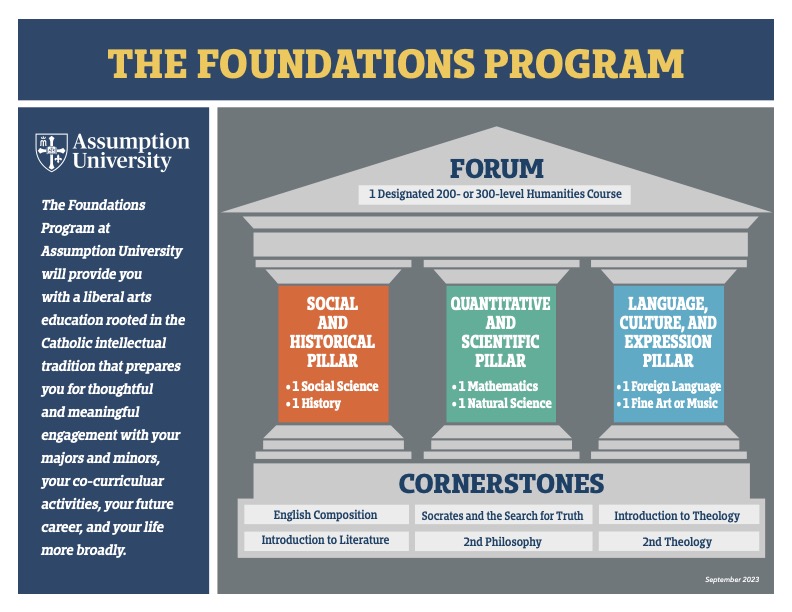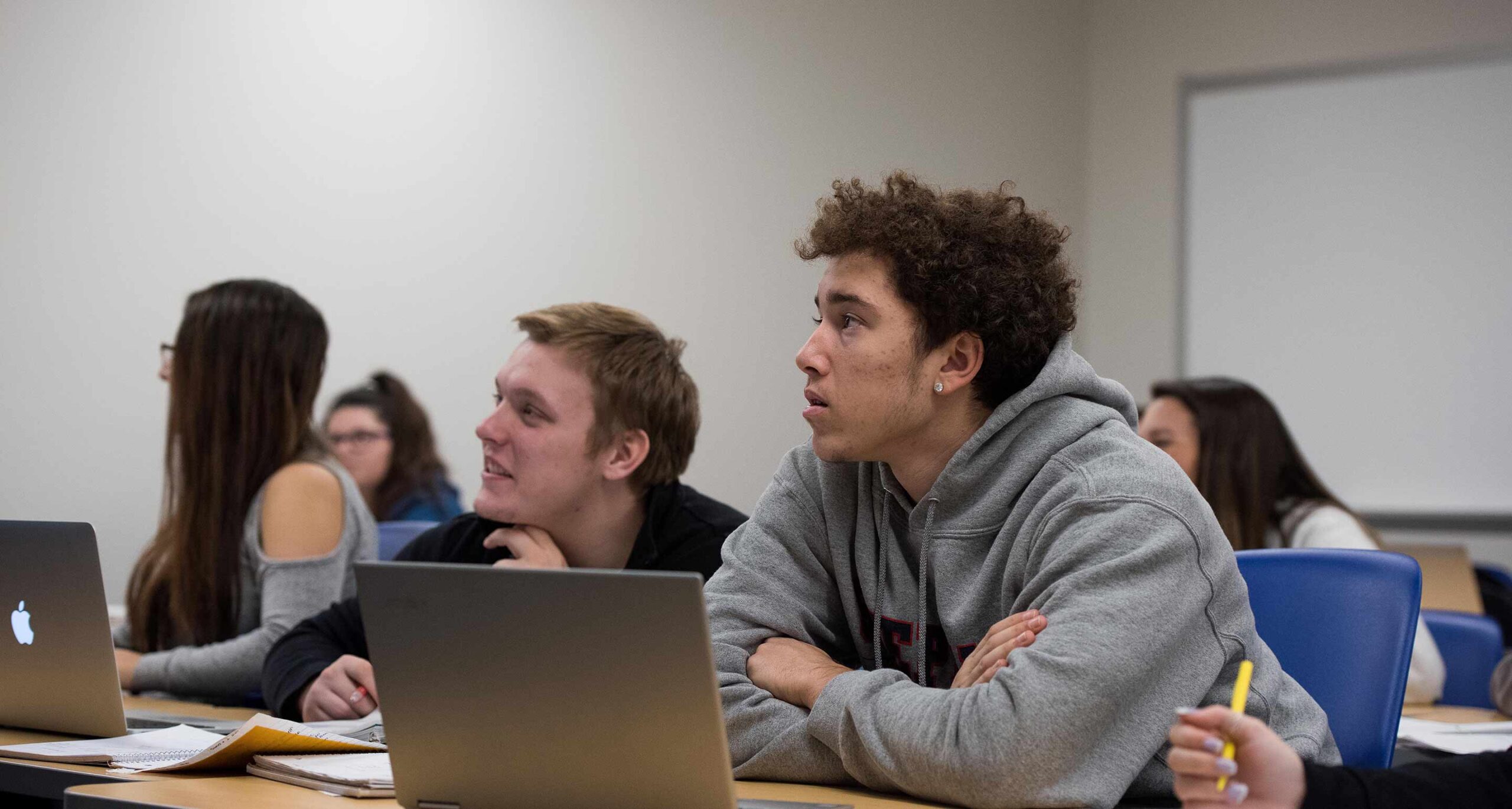The Foundations Program will provide you with a Catholic liberal arts education that prepares you for thoughtful and meaningful engagement with your majors and minors, your co-curricular activities, your careers, and your lives more broadly. Enlivened by the Catholic affirmation of the harmony of faith and reason, Foundations will immerse you in multiple modes of inquiry as you boldly seek the true, the good, and the beautiful wherever they can be found. By encouraging you to pursue truth in the company of friends, Foundations will help you develop academically, emotionally, personally, and spiritually. In these ways, the Foundations Program will further Assumption University’s mission of forming you into a person known for intellectual seriousness, thoughtful citizenship, and devotion to the common good.

Cornerstones: In Cornerstone courses, you will engage in thoughtful reflection about weighty human concerns by examining literary, philosophical, and theological investigations of the human condition. Cornerstone courses place special emphasis on helping you develop the arts of reading, writing, thinking, and conversing.
Pillars: Pillar courses complement Cornerstone courses by leading you to pursue concrete and empirical investigations that attend to the dynamism, diversity, and development of human beings and the social, cultural, and natural worlds we inhabit.
- The Language, Culture and Expression Pillar will lead you in an exploration of patterns of meaning in languages, cultures, and the arts, helping you cultivate mutual understanding and a sense of the diversity and beauty of human expression.
- The Quantitative and Scientific Pillar will provide you with a mathematical foundation and an understanding of scientific inquiry, enabling you to appreciate the value of mathematics and the natural sciences as human activities.
- The Social and Historical Pillar will help you to situate human behavior within its historical and social contexts, empowering you to further understand the value and diversity of human experience.
Forum: Forum courses build on Cornerstone and Pillar courses by giving you the opportunity to pursue your studies beyond the introductory level in a discipline that you find especially fascinating. In your Forum course, you will examine an enduring question and/or formative debate that has shaped a particular discipline in order to develop a deeper appreciation of this discipline’s nature and its significance within the modern world.
Forum courses include course offerings from Art History, English, History, Modern and Classical Languages and Cultures, Philosophy, Political Science, and Theology. Forum courses cannot double-count with your major but may double-count with a minor or second major.
More on Assumption’s Foundations Program
Assumption University Mission Statement
Assumption University is a comprehensive, private Catholic liberal arts institution, sponsored by the Augustinians of the Assumption. We awaken in students a sense of wonder, discovery, and purpose, forming graduates known for their intellectual seriousness, thoughtful citizenship, and devotion to the common good. Our curricular and co-curricular programs provide students with an education that shapes their souls, forms them intellectually, and prepares them for meaningful careers. We are a diverse community that welcomes different points of view and embraces all who share our mission. Enlivened by the Catholic affirmation of the harmony of faith and reason and by the pursuit of the truth in the company of friends, an Assumption education transforms the minds and hearts of students.
Assumption University: A Comprehensive Catholic Liberal Arts Institution
Assumption is a ‘comprehensive Catholic liberal arts institution’ because it offers all students an education that is rooted in an approach to the liberal arts informed by the Catholic intellectual tradition. It is a ‘comprehensive Catholic liberal arts institution’ because it offers students an education that extends to the pursuit of specialized knowledge, vocational preparation, and pre-professional studies.
All majors, minors, and programs at Assumption share its mission of providing students with an education that awakens ‘a sense of wonder, discovery, and purpose’ in students, and all majors, minors, and programs contribute to Assumption’s work of ‘forming graduates known for their intellectual seriousness, thoughtful citizenship, and devotion to the common good.’ However, there is an important difference between Catholic liberal arts education, on one hand, and specialized knowledge, vocational preparation, and pre-professional studies, on the other. In a comprehensive institution, specialized knowledge, vocational preparation, and pre-professional studies are important, and they find their principal home in majors and minors. Catholic liberal arts education is also important, and it finds its home principally in the Foundations Program.
While the two elements of an Assumption education are different, they are also related and complementary. On one hand, the Catholic liberal arts education that students receive in Foundations enables them to approach their majors, minors, careers, and lives in a uniquely thoughtful way. On the other hand, the specialized knowledge, vocational preparation, and pre-professional studies that students pursue in their majors and minors give them an opportunity to apply the perspectives, skills, and habits of mind developed in Foundations in ways that illuminate the concrete relevance of Catholic liberal arts education in and for a meaningful career and a fulfilling life. The dynamic interplay between Assumption’s Foundations Program and itsvarious majors and minors is the heart and soul of an Assumption education—it is what makes an Assumption education uniquely vibrant, significant, and valuable
The Tradition of Catholic Liberal Arts Education
Liberal arts education is education in and for freedom. Liberal arts education aims to liberate students from their attachment to unquestioned assumptions, unconscious prejudices, and unexamined beliefs so that they become capable of free and open inquiry that seeks the true, the good, and the beautiful in all domains of human life.
One of the earliest and most influential articulations of the nature and significance of liberal education is the “Allegory of the Cave” in Plato’s Republic, in which Socrates describes the process of philosophic education as a liberation from the chains of unquestioned opinion that makes possible an enlightening ascent to an ever more adequate understanding of reality and morality. Following Plato, Roman thinkers argued that the serious study of the seven liberal arts (grammar, logic, rhetoric, arithmetic, geometry, astronomy, and music) is the most effective way to promote a liberating education. Eventually, these classical outlooks were integrated into the Catholic intellectual tradition. With the rise of the medieval university in Europe, theology emerges alongside philosophy as its counterpart, and together, these disciplines—and their different ways of exploring the relationship between faith and reason—become the twin cornerstones of Catholic liberal arts education. With the advent of the modern world and the rise of modern science, the university underwent an evolution in the eighteenth and nineteenth centuries, and the disciplines we now call ‘the humanities’ emerged as complements to philosophy and theology. In the first half of the 20th century, American Catholic liberal arts colleges and universities worked to synthesize the Catholic intellectual tradition’s emphasis on the foundational role of philosophy and theology for liberal arts education with the modern recognition of the value of other humanistic disciplines. Subsequently, in the second half of the twentieth-century additional efforts were made to create more comprehensive and inclusive approaches to Catholic liberal arts education that incorporate the natural and social sciences.
This historical account provides crucial background for understanding the nature, purpose, and structure of Assumption’s Foundations Program. The Foundation Program articulates the framework through which Assumption provides its students with a Catholic liberal arts education. The Foundations Program’s goal is to further the pursuit of the truth through existentially meaningful humanistic inquiry that explores fundamental questions of value and meaning in a way that liberates students to seek the true, the good, and the beautiful.
Goals of the Foundations Program
Cornerstones
Learning Goal: You will engage in thoughtful reflection about weighty human concerns in search of what is true, what is good, and what is beautiful by:
- Reading, analyzing, and interpreting works of literature, philosophy, and theology
- Understanding and practicing the forms of inquiry characteristic of literary, philosophical, and theological investigations of the human condition
Learning Goal: You will engage in rational discourse and develop the arts of reading, writing, thinking, and conversing by:
- Understanding others’ views and the reasons for them
- Articulating your own views and giving reasons for them
Language, Culture, and Expression Pillar
Learning Goal: You will further your understanding of the diversity and beauty of human expression by:
- Identifying patterns of meaning in language and art
- Creating meaning through art and/or in a language other than English
- Exploring cultural dimensions of our complex world
Quantitative and Scientific Pillar
Learning Goal: You will further your understanding of mathematics and the natural sciences as valuable human activities by:
- Applying mathematical methods, models, and strategies to solve problems
- Utilizing methods and tools employed by the natural sciences
- Describing and understanding processes at work in nature
Social and Historical Pillar
Learning Goal: You will further your understanding of how and why human behavior is situated in its social, political, and historical contexts by:
- Analyzing interactions between individuals and social and political forces over time
- Examining how and why organizations, institutions, communities, and/or movements create and change practices, rules, policies, and/or laws
- Evaluating practices, rules, policies, and/or laws that govern particular organizations, institutions, communities, and/or movements
Forum
Learning Goal: You will further your understanding of one humanistic discipline and this discipline’s significance by:
- Analyzing an enduring question and/or formative debate
- Understanding how and why this question and/or debate develops over time
- Exploring how this question and/or debate relates to your life and the contemporary world
Learning Goal: You will further your understanding of how and why primary sources shape and illuminate enduring questions and/or formative debates in the humanities by:
1. Investigating how a particular humanistic discipline understands and uses primary sources
2. Analyzing one or more primary sources to explain how they shape the humanistic discipline you are studying

